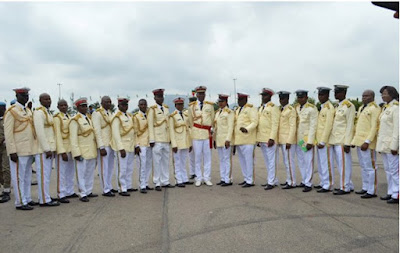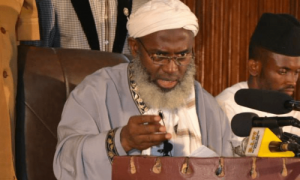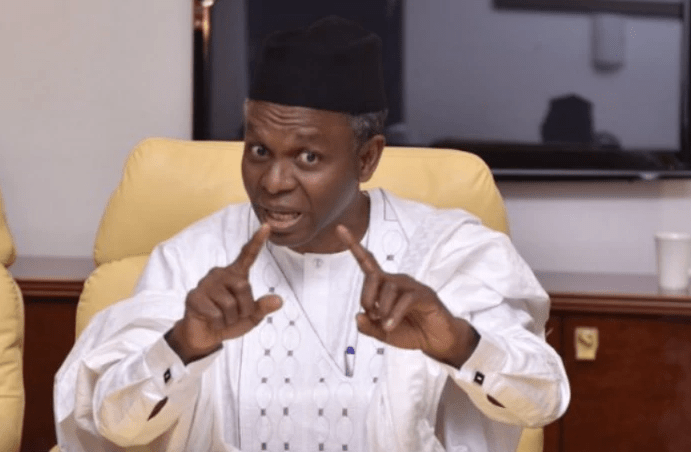Latest News
NANS, Youth Council urge Buhari to sign Peace Corps Bill, as Presidency expresses hope for assent
Barely two weeks after the Nigerian Peace Corps Bill was submitted to President Muhammadu Buhari for assent, a joint session of the National Youths Council of Nigeria (NYCN) and the National Association of Nigerian Students (NANS), have called on the President to urgently sign the Bill into law.
This was even as the Senior Special Assistant to the President on National Assembly Matters (Senate), Senator Ita Enang, has expressed optimism that the Bill, amongst others, was currently receiving attention by the President.
“The President is working on it, in accordance with our standard operating procedures. It’s being attended to and I’m also aware that the President has up to 30 days to sign Bills”, Enang had told National Assembly Correspondents in Abuja on Tuesday.
At a world press briefing jointly addressed by NYCN and NANS in Abuja on Thursday, the youths concluded that, “assenting to Nigerian Peace Corps Bill will be our President’s best gift to the Nigerian youths and students”.
Comrade Murtala Mohammed Garba, the National President of NYCN and Comrade Aruna Kadiri, National President of NANS, who spoke on behalf of the forum, said job creation and youth empowerment were cardinal parts of President Buhari’s campaign promises and that, urgent assent to the Peace Corps Bill would go along way to delivering on his promises.
The duo acknowledged the fact that the security agencies in the country were doing their best but, like other developing countries, the place of Nigerian Peace Corps cannot be overemphasized, as no existing agency does exactly what the Peace Corps stands for.
“A critical analysis of this all important Bill will clearly reveal that the functions being sought by the Nigerian Peace Corps is akin to that of the American Peace Corps, Canadian Peace Corps, Bangladesh National Cadet Corps, Peace Officers Commission in China, Chinese Labour Corps, Lera Uniform Corps of Malaysia, Malaysian People Volunteer Corps and others.
“It is thus not a duplication of any existing government agencies but a body that when given a statutory backing will serve as a reservoir and feeder structure that will provide manpower for government establishment in times of needs, during emergencies and urgencies.
“Lasting and enduring peace is only achievable on the platform of diligent neighbourhood watch and intelligence gathering. Taking proactive steps towards ensuring lasting peace would mean that intelligence gathering approach around our communities and educational institutions, places of worship, public institutions, township streets, villages, ought to be properly manned by diligent men and women with the background knowledge of the areas and solely trained for that purpose.
“The gun barrel approach and use of force as epitomised in clamping down on law breakers and criminal elements is only reactionary and not a proactive step. While breakers of Nigeria’s extant laws can be properly taken care of by the Police and other sister security agencies, the task of minimising the offshoots of criminal elements can be curtailed by the signing into law of the NPC Bill, to give statutory backing to the existing Peace Corps of Nigeria.
“No doubt, the functions of the NPC do not overlap with that of any security agencies in Nigeria; rather, it is to complement the efforts of the existing agencies by increasing their efficiency through preventive and intelligence – gathering measures rather than reactive measures that are currently prevalent”, they said.
While assuring President Buhari of total loyalty, patriotism and nationalism, the youths prayed for the President for the much needed grace, wisdom and strength to carry on with his mandate.
Present at the briefing were other youth based voluntary organisations such as, Royal Rangers, Man’O’War, Boys and Girls Brigade and Boys Scout of Nigeria.
The Nigerian Peace Corps (Establishment) Bill 2017 was sent to Presidency for assent on Wednesday, 27th December 2017.
When signed into law, the Bill would give legal backing to the existing Peace Corps of Nigeria under the leadership of Amb (Dr.) Dickson Akoh.
Part VIII (1) of the final version of the Bill before Mr. President reads, “The Peace Corps of Nigeria (in this section refered to as ‘Peace Corps’) existing before the commencement of this Act is dissolved”.
Subsections 5 and 6 of the same part VIII, however, allowed all serving members of the Peace Corps of Nigeria, both Regular and Volunteers, to be absolved into the Nigerian Peace Corps, at commencement.
The Bill also allows intending members between ages 18 and 35, other than the existing members of the PCN, to undergo one month mandatory orientation training.
The head of the Peace Corps, as captured in the Bill, shall be referred to as National Commandant, to be appointed by the President upon recommendations of the supervising Minister, for the period of 5 years which is renewable once.
The Nigerian Peace Corps, upon establishment, shall be domiciled with the Federal Ministry of Youths and Sports Development, under the supervision Honourable Minister.
The core mandates of the Corps is to develop, empower and provide gainful employment to the youths, in order to facilitate Peace, Volunteerism, Community Services, Neighbourhood Watch, nation-building and other related matters.
The duties of officers are mainly at the educational institutions within the country, and to carry out other functions as provided in the bill.
























